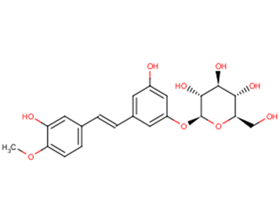
Rhaponiticin
CAS No. 155-58-8
Rhaponiticin( —— )
Catalog No. M18081 CAS No. 155-58-8
Rhaponticin(Rhaponiticin) can alleviate liver steatosis and improve blood glucose and lipid profiles in KK/Ay diabetic mice, indicates that rhaponticin has a noticeable antidiabetic effect.
Purity : >98% (HPLC)
 COA
COA
 Datasheet
Datasheet
 HNMR
HNMR
 HPLC
HPLC
 MSDS
MSDS
 Handing Instructions
Handing Instructions
| Size | Price / USD | Stock | Quantity |
| 5MG | 49 | In Stock |


|
| 10MG | 88 | In Stock |


|
| 25MG | 157 | In Stock |


|
| 100MG | Get Quote | In Stock |


|
| 200MG | Get Quote | In Stock |


|
| 500MG | Get Quote | In Stock |


|
| 1G | Get Quote | In Stock |


|
Biological Information
-
Product NameRhaponiticin
-
NoteResearch use only, not for human use.
-
Brief DescriptionRhaponticin(Rhaponiticin) can alleviate liver steatosis and improve blood glucose and lipid profiles in KK/Ay diabetic mice, indicates that rhaponticin has a noticeable antidiabetic effect.
-
DescriptionRhaponticin(Rhaponiticin) can alleviate liver steatosis and improve blood glucose and lipid profiles in KK/Ay diabetic mice, indicates that rhaponticin has a noticeable antidiabetic effect and could be potentially used as a new agent to treat type 2 diabetes mellitus and its complications.
-
In Vitro——
-
In Vivo——
-
Synonyms——
-
PathwayOthers
-
TargetOther Targets
-
RecptorOthers
-
Research AreaInflammation/Immunology
-
Indication——
Chemical Information
-
CAS Number155-58-8
-
Formula Weight420.41
-
Molecular FormulaC21H24O9
-
Purity>98% (HPLC)
-
SolubilityIn Vitro:?DMSO : 250 mg/mL (594.66 mM)
-
SMILESCOC1=C(C=C(C=C1)C=CC2=CC(=CC(=C2)OC3C(C(C(C(O3)CO)O)O)O)O)O
-
Chemical Name——
Shipping & Storage Information
-
Storage(-20℃)
-
ShippingWith Ice Pack
-
Stability≥ 2 years
Reference
molnova catalog



related products
-
Vicenin -1
Vicenin-1 possesses potent anti-inflammatory and anti-oxidant activity.
-
Inositol nicotinate
Inositol nicotinate has the effect of lowering cholesterol and expanding peripheral blood vessels for hypercholesterolemia and atherosclerosis.
-
Boc-FAAGRK-AMC
Boc-FAAGRK-AMC



 Cart
Cart
 sales@molnova.com
sales@molnova.com


